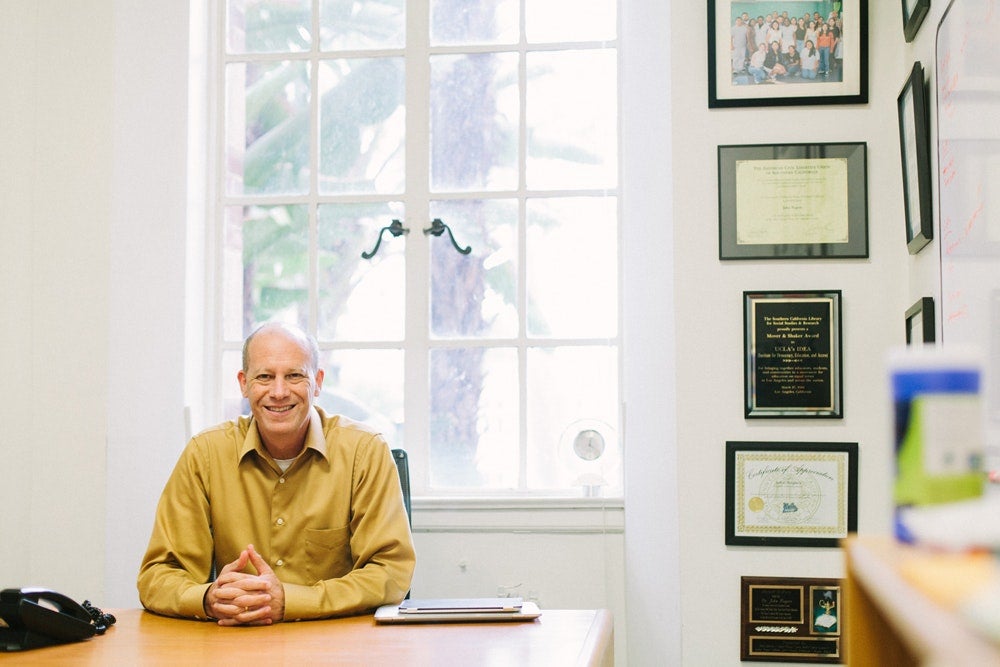Longtime supporters Bobbie and Mark Greenfield annually recognize UCLA Ed&IS research to improve elementary and secondary learning.
UCLA Professor of Education John Rogers has been recognized with the 2021 Bobbie and Mark Greenfield Faculty Award for Applied Research in Learning and Achievement. The $2,500 award is given each year to recognize the work of a UCLA School of Education & Information Studies faculty member whose published research is exemplary and has important implications for better teaching and learning in K-12 classrooms that serve the nation’s most vulnerable children and youth.
Rogers, who directs the UCLA Institute for Democracy, Education, and Access, is honored for his 2020 study, “Learning Lessons: U.S. Public High Schools and the COVID-19 Pandemic in Spring 2020,” co-written with Michael Ishimoto, Ph.D., an IDEA Fellow who recently joined the California Department of Education’s research team. The report is based on a survey with high school principals across the nation during the early months of the pandemic as schools were shuttered and teaching and learning went to an online environment.
In addition, Rogers is honored for his 2020 co-written report on “Reclaiming the Democratic Purpose of California’s Public Schools,” an examination of current statewide issues around civics teaching and learning.
The Bobbie and Mark Greenfield Faculty Award for Applied Research in Learning and Achievement was first given in 1987. The Greenfields established this as an endowed award in 2008, guaranteeing that it as an annual faculty award for UCLA Ed & IS.
Recently, Professor Rogers discussed the impact of the pandemic on public schools with The Latest, pointing out the unsung work of school principals who have had to fill in as ad hoc counselors, social workers, and even custodial staff, while overseeing the emotional and physical wellbeing of students and their families and communities.
How has the pandemic affected U.S. high school students?
John Rogers: The crisis has posed intersecting health and economic challenges that have been felt in particular communities more than others. I am deeply concerned about the ways that inequalities which existed prior to the pandemic have been exacerbated in the context of the pandemic. To take an extreme example, several principals leading schools in high-poverty communities have talked to me about students who have had to enter the workforce over the last 18 months to fill the gaps created by parents who were ill or who had lost their jobs.
What should be done as students are returning to campus—some for the first time since March 2020?
Rogers: As schools reopen this fall, educators must meet students where there are, providing necessary services and addressing trauma and mental health issues. My hope is that districts will be able to use federal and state funds to provide young people with additional supports as they return to school. I also hope that district leaders encourage educators to reimagine teaching and learning. We want students to feel welcomed and cared for and to experience their education as meaningful to themselves and their communities.
Will more teaching staff be hired to effectively and compassionately address learning loss, and to accommodate students who have to work to support their families?
Rogers: We entered the pandemic in California and, to a lesser extent, across the nation, with a teacher shortage. And the last several months have left some educators more inclined to leave the profession because they are just so burnt out. So, unfortunately, even though districts have additional funds there are real challenges to ramping up the teaching force at this time.
How are principals and administrators faring?
Rogers: The strain on principals has been extraordinary. It has been an incredibly hard year and a half for many principals. Oftentimes they’ve been the only staff on otherwise closed campuses. Or in parts of the country that offered in-person learning throughout last year, principals had to become public health officials in addition to all of their other responsibilities.
The level of commitment from those principals oftentimes has gone unacknowledged. It’s really important that we recognize the contributions they’ve made, just as it’s important to acknowledge the contributions of teachers who made every effort to meet the needs of their students in these extraordinary times.
